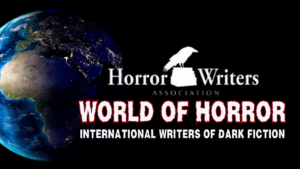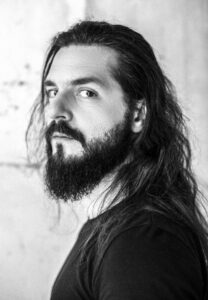
Flavius Ardelean-Bachmann is a Romanian award-winning writer of dark fiction, the author of nine novels and three short story collections for adults and children. His work has been translated into German, Russian and Hungarian, and he made his English-language debut in the first volume of the Valancourt Book of World Horror Stories. Flavius has a master of arts in publishing from the Oxford International Centre for Publishing Studies, with a dissertation on the horror book industry, and has translated fiction from English and German into Romanian, most notably the cult classic The Other Side by Alfred Kubin. He lives in Germany.

What was it about the horror genre that drew you to it?
I was attracted to its aesthetics long before I even knew what it was. Some of my first memories include hiding from my parents and watching scenes of “Twin Peaks,” “Tales from the Crypt” or “Hellraiser” when I should have been in bed and long asleep. I had a grandmother who used to tell scary stories at bedtime, and most of my early drawings featured skeletons, graves and bats. I also started listening to metal music very early on, so that also fed into my appetite for darkness—I remember watching the video of “Gods of Emptiness” by Morbid Angel on television and being blown away. So, I suspect it was a combination of inherited temperament and chance socialization with the genre that made a later fan of horror out of me.
Is there a horror tradition in your country, in your culture? A taste for horror, a market? Not necessarily literature; perhaps oral tradition too.
I could say there is a tradition—we have a lot of monsters and evil people in our mythology and fairy tales—but, unfortunately, that does not necessarily translate into a mature market for horror. The Romanian book market is generally very small (as far as I know, the smallest one in Europe by books sold per person), and you can imagine that only a tiny slice of that is represented by horror fiction. You sometimes find horror influences in Romanian fantasy and science fiction and a few horror books here and there, but I would not call it a market yet.
Who are some of your favorite characters in horror, internationally and/or in your own culture?
I think Dracula is an amazingly tragic and unique horror figure. I was born and raised in Transylvania, not far from the famous Bran castle, so I might be a bit biased. As for more modern renditions of horror characters, I am a fan of Pinhead and his Cenobites.
Do you make a conscious effort to include characters and settings from your country in your writing, and if so, what do you want to portray?
I make a conscious effort not to include them, and with one exception, I think I managed quite well. The exception is also the only story I have published in English, in the Valancourt anthology, a story that features creatures and symbols from Romanian folklore. But, for the most part, I did my best to create original monsters in my novels and short stories. Cultural emanations are inevitable, and they do shape a consciousness, but I think creators have a responsibility to identify their own monsters that need to be released from the psyche and to create their own mythologies.
If you are not a native English speaker, but write in English, do you first think of horror in your native language or English? How do you draft them in your mind, in English or your mother tongue?
I write only in my mother tongue, which is Romanian, and never tried to write in a different language. Even though my brain is fluent in both English and German, it seems that my soul only speaks one language, and I thought it best to respect that.
What has writing horror taught you about the world and yourself?
Horror does help me shape the things that are harder to express with usual language. By highlighting the undesirable, I get to come closer to what is to be desired. The dark side of the moon, the hidden aspects of the personality, the repressed desires, the liminal existence—they all have a place in the wholeness of being. It is surely not comfortable, but I believe it is the duty of the creator of horror to go to where it hurts most, to get his or her hands into the rot and pull the root out and show it to everyone: Here, this is what you refuse to see! But it leaves a mark on the soul, so I guess you win some, you lose some.
How have you seen the horror genre change over the years? And how do you think it will continue to evolve, both in the US and in your country?
I think horror pulls a lot of strength from societal fear and confusion, and there is a lot of that going on now, so I imagine it will remain relevant in the culture for the next years. Sometimes, horror as a fictional expression does take a step back and hibernates like a dormant virus, ready to take over the planet when the time is right. It is mythmaking; therefore I think it will stay with us, albeit in different forms.
How do you feel the international horror writing community has been represented thus far in the market, and what hopes do you have for representation going forward?
As with any other international literary community, horror has difficulties reaching a global market due to more technical aspects that don’t really have anything to do with its energy and meaning. Money plays a big role in this—translations are expensive, agents require their share, the horror market is small in many countries. Take a language like Romanian: Publishers react to market demand with small print runs that don’t generate a lot of income. With this incredibly small income an author cannot take on the help of an agent, so most stories do not reach the global players. And to get their attention, you need to have some translated material anyway. I do place some hope in AI support; I can imagine AI-generated translations playing a bigger role in this discovery process. A lot of other crowd-funded and innovative solutions can help disrupt the production chain a bit and even help publishers with publishing works. But this is all speculation on my part; I am no player in the field.
Who are some international horror authors you would recommend?
I prefer not to name any names, so I would highly recommend both volumes of the Valancourt Book of World Horror Stories; I think they represent an amazing showcase of what the genre has to offer around the world.
What is one piece of advice you would give horror authors today?
Read a lot. Don’t focus on horror alone. Get in hard and fast, and get out before you start imitating your own stories.
And to the writers from your country out there who are just getting started, what advice would you give them?
Give up writing. And if you notice you cannot give up, you don’t need any advice from anyone.


So good to read you, Flavius! Your answers are very interesting. I just hope your prophecy in regard to translations boosted by AI does not come to life! I am a translator, and it would be terrible. Translators are pollinators, after all. I would not appoint such an important task to algorithms. (It will end up happening, anyway; all of us eaten up by bots) Don’t be a stranger, good luck!